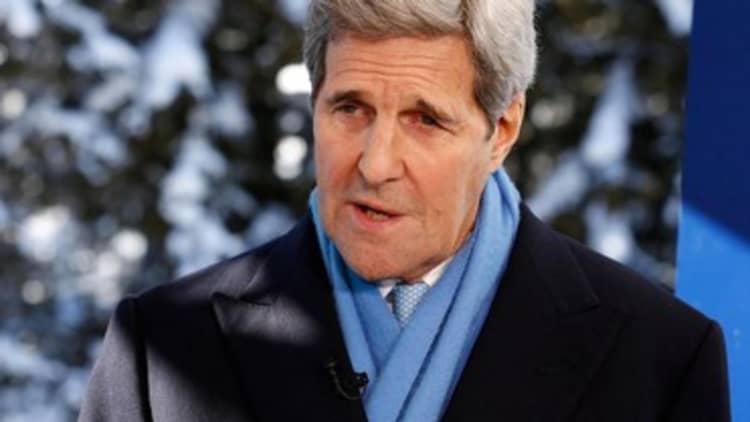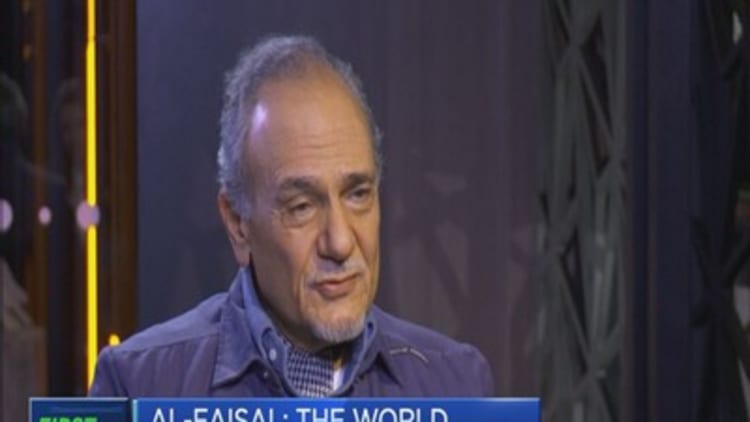


Secretary of State John Kerry said Thursday there is no end to the diplomatic challenges America faces, but he is absolutely certain the world is safer for having reached a nuclear accord with Iran.
He said reaching that deal allows the U.S. to tackle other priorities, including Syria.
"Iran was hurtling towards an unaccounted for, uninspected, full-fledged nuclear program with high levels of enrichment where they had enough enriched material to make 10 to 12 bombs," Kerry told CNBC's "Squawk Box" at the World Economic Forum in Davos, Switzerland. "Now, frankly, at Iran's consent and agreement, they have rolled that back."
The international community ended sanctions on Iran related to its nuclear program earlier this month after determining that Tehran met the terms of a deal reached last year. Those terms included shipping enriched material to Russia, drawing down its stock of centrifuges and destroying a plutonium reactor.
Long-standing U.S. sanctions related to Iran's support for terrorist groups and its human rights record remain in place. The Treasury Department this week imposed new sanctions on 11 companies and individuals who the United States says helped to advance Iran's ballistic missile program.
Shortly before that, Iran released four American prisoners in exchange for the release of seven Iranians held for violating U.S. sanctions and an agreement to drop international arrest warrants for 14 others.
With inspectors in place and Iran's presumed inability to enrich enough material to make a nuclear bomb, Kerry said, the United States can focus on civil wars in Syria and Yemen, an ongoing conflict in Libya, and North Korea's continued nuclear ambitions.
The end of sanctions frees about $100 billion in frozen Iranian funds, but Kerry said Tehran will only have access to roughly $55 billion because much of that money will go toward repaying loans and other long-term commitments. The rest will likely be used to address Iran's ailing oil operations and other infrastructure that went without maintenance for years, he added.
While there is no evidence that Iran is funneling newly released funds to organizations that the United States considers terrorist groups, Kerry said he believes Iran will eventually continue to support such groups.
However, he said that support for such groups has never made a difference in the power structure in the region. He noted that Saudi Arabia alone spends much more than Iran per year on defense.
"It's so incredibly disproportionate that I believe that working with our Gulf state partners, which we are going to do and which we are upgrading, we have the ability to guarantee that they will be secure, that we will stand by them, even as we look for this potential of a shift in behavior," he said.
Kerry also confirmed that he had met with Israeli Prime Minister Benjamin Netanyahu, a staunch critic of the Iran deal, in Davos. He said he respects Israel's perception of the Iranian threat to its existence, and while the Obama administration acknowledges that threat, it differs on how to best manage it.
"Israel was facing a country that is in opposition to Israel and Israel's existence that was moving towards a nuclear weapon, and moving at a rate that was extremely disturbing," he said. "President Obama decided the first way to deal with it, before you start dropping bombs or going to war, is to see if you can find a diplomatic solution."
Despite signs of thaw, Iran's Supreme Leader Ayatollah Ali Khamenei has warned his country to remain wary of American "deceit," and Iranian leaders have denounced the new ballistic missile sanctions.
Kerry said the Obama administration obviously wishes the rhetoric were otherwise, but noted that Tehran says it is responding to American criticism.
"What I'm trying to do and what President Obama is trying to do principally is move us away from that kind of confrontation and put to test whether or not we can find cooperation," he said.
For example, the United States and Iran have sat down with other powers to discuss a path for Syria, where the two are at odds, he said. The nuclear agreement also offers the potential to address Yemen's civil war, he added.
"We look to Iran, as President [Hassan] Rouhani himself said, to make this a turning point," Kerry said. "Just saying that doesn't make it happen. You have to test it and now see where we're going."








